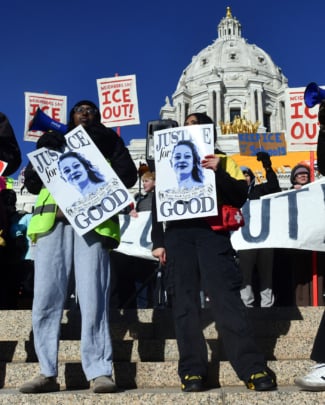“There is not a single place that has said, ‘We don’t want to be all in for foster adoption,’” Johnson says. She specifically praises the work of Arizona Gov. Doug Ducey, Louisiana Gov. John Bel Edwards, Ohio Gov. Mike DeWine, and New Hampshire Gov. Chris Sununu—whose state has only 43 foster children available after adoptions tripled between 2016 and 2019. . . .
Johnson’s message to governors also includes encouragement to seek out and work with faith-based groups—to find both foster care and adoptive homes. She says during the last decade she watched as faith-based groups in Colorado were defunded and boxed out due to their beliefs and the religious component of their programs.
“These kids just went on to the streets because no one else wanted to deal with them,” Johnson says. “By bringing nonprofits and faith-based together, we build a bigger team.” . . .
Last year HHS issued a waiver for a South Carolina ministry with a long-standing commitment to work only with Protestant families, a policy that came into conflict with a nondiscrimination regulation the Obama administration enacted in its final days. This year HHS proposed a rule to remove that regulatory burden from all 50 states.
(A Catholic woman is suing the state and federal governments for allowing Miracle Hill Ministries to work only with people who share its Protestant beliefs. This fall the Supreme Court is scheduled to hear a case in which Catholic Social Services of Philadelphia is challenging the city’s right to cancel the agency’s contract because it will not place foster children with same-sex couples.)
The Taylor family has felt the effects of Johnson’s effort to create a more friendly environment for faith-based organizations. “I have seen that change,” said Pam Taylor, Trent’s mother. She says the most important part of their ministry is the hope and healing found in Christ, but they had seen doors close if they included it in their work.
Earlier this year they changed their organizational structure to incorporate their Christian faith more clearly. “There are a few agencies I assumed would no longer work with us, but they were very, very willing,” Pam said.
The net result has been compelling: In addition to the number of children in foster care dropping, adoption numbers are rising. Foster care adoptions have consistently totaled 50,000-plus per year, but the last two years saw 63,000 and 66,000 adoptions—the highest numbers since data collection began in 1995.
“The degree of emphasis Assistant Secretary Johnson has put on adoption has been greater than her predecessors,” said Nate Bult, senior vice president for government affairs for Bethany Christian Services, the nation’s largest evangelical adoption agency. “It’s not that previous assistant secretaries were hostile, but Johnson has put it at the top of her agenda.”
“When a child floats around in the system for five years, it affects their ability to trust and attach to people.”
IN JUNE, President Trump signed an executive order that does little now but encourages improved data collection about public-private partnerships, support for caregivers, keeping siblings together, and eliminating bureaucratic barriers to adoption. “The executive order is a long-term solution,” AEI’s Naomi Riley said. It also mandates a study of the Multiethnic Placement Act of 1994 (which aimed to remove barriers to interracial adoption) and emphasizes the need for faith-based organizations. Nancy Kay Blackwell with the Congressional Coalition on Adoption Institute said the latter two objectives are directly related: “A lot of faith-based partners led the way in interracial placements and adoptions.”
Much of the order’s success will hinge on the better data collection it requires from states. Right now most states don’t know exactly how many foster families they have or the retention rate among the families they do have (between 30 percent and 50 percent of foster parents quit in the first year). Most states also don’t have a good profile of the most successful foster families, preventing them from launching targeted recruitment efforts. Most foster recruitment consists of a broad call for help using mediums such as TV, radio, and billboard ads. “The data is hugely important, because it can be used to do more targeted recruitment of potential families,” Riley said. . . .
More than 120,000 children are waiting on a family to adopt them, and each year about 20,000 age out of the system with no permanent support—which makes them much more likely to experience a range of negative outcomes as young adults. Critics said the executive order did not provide “tangible supports” (i.e., funding for things like housing and day care) for low-income families or sufficiently address racial disparities in the foster care system: “The administration could achieve greater impact by researching front-end inequities—such as reporting and investigations—which could shrink the universe of youth considered for care,” the left-leaning First Focus on Children said in a statement.
But, undoubtedly, the biggest challenge is COVID-19 and its related fallout. Since March, child abuse hotline calls have plummeted, hospital reports of severe abuse cases have risen, and mandatory reporters (school counselors, pediatricians, etc.) have much less to report with fewer touch points with children. Perhaps worst of all, this month The New York Times reported many child welfare workers are not investigating incidents out of coronavirus fear.
“The idea that calls have come in and they’re sitting at home, that’s a huge source of concern,” Riley told me. “Time is not on your side with these kinds of reports.”
At HHS, the Administration for Children and Families has sent out repeated guidance making it clear that child abuse must be investigated as usual. In March, Children’s Bureau Commissioner Jerry Milner sent a letter to child welfare and judicial leaders reiterating the requirements HHS would continue to enforce during the pandemic. He called for courts to “use flexible means of convening required hearings” and adjudicate cases “in a timely manner.”
In April, HHS officials sent related letters to governors, state supreme court chief justices, and child welfare leaders, calling for, among other things, innovation, provision of personal protective equipment, and class 1 emergency classification for child welfare workers.
Lynn Johnson cited Arizona as an innovative state, successfully closing hundreds of adoptions virtually. She wants that work to continue: “Whether [the pandemic] gets better or worse, now we have to keep this going.”
Trent Taylor said he appreciates Johnson, and her actions give him hope. “I am so truly thankful that foster care and adoption are the focus of those who have the ability to make a positive change for those who are in the system,” he said. “We have been invisible for so long.”








Comments
Lord, we thank you for people like the Taylors, who can love & care for these precious children.
Thank you for Trent & Mike & for their example of how Christian faith can positively affect a child.
We have a house that if anyone wanted to fix it could be an orphan home: for the true gospel is to take care of the widow and the orphan. We are retired : but the LORD gave us this place and a name Joseph’s coat of many colors house of bread.just waiting on HIM .
The system needs to loosen some of its requirements. In Missouri, when I got my grand kids in 2007, There were many rules the Dept. of Child services had that were very hard to provide. I did it at great cost. The counseling treatments were ok, but I don’t think it helped the problems. I pray to God, that changes will be made. The child does not need a room of their own. Most of them like to share a room with someone their own age. Look more into the lives of the potential foster parents to eliminate the abusers before it happens. Listen to the children, not just their voices, but their actions. I pray that the hate that is rampant in this world will go away and love will be put in it’s place. God’s Love, not Sexual love. Let’s all be in one accord, Dea rFather GOd, In Jesus name I ask that the hate in this world disappear into the pits of hell and that love be put into its place, now. Amen
Thank you for what the president has done. Give wisdom to theeader of this system. Have mercy on children so they may have loving families.
Lord God, the brokenness of our culture is so overwhelming. Reading this article is difficult and offers little hope. Lord, we stand in need! We need You to guide and direct us and to renew hearts and help restore families. Lord, the enemy has done much damage and he seems to have destroyed so many along his path of destruction. Lord, please move Your hand! How long must we watch this world set aside Your presence and Your Sovereign Power? How long must many suffer from the evils of others? Oh Lord, please come soon. We are weary and the task seems overwhelming. I rest on Your Truth! But God…over and over in Your Word we see “But God”. This is our Hope! You can do all things! You can make the impossible possible. Oh Lord, move in Your church! Give me courage and hope. Help me and my brothers and sisters in Christ to not grow weary of well doing! Until You return or call us home, give us all we need to stand firm and hold fast!